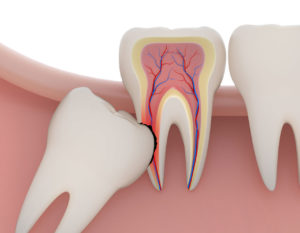Wisdom Teeth
 Every year, millions of people have their wisdom teeth removed. If you suspect your wisdom teeth are coming in, or your dentist has recently suggested removal, you probably have some questions. Here are some of the most common queries surrounding wisdom teeth, as well as their answers.
Every year, millions of people have their wisdom teeth removed. If you suspect your wisdom teeth are coming in, or your dentist has recently suggested removal, you probably have some questions. Here are some of the most common queries surrounding wisdom teeth, as well as their answers.
What Are Wisdom Teeth?
Wisdom teeth are our third molars, but they typically don’t come in until well after our other adult teeth have grown in. There are four wisdom teeth in total, one at the very back of each corner of your mouth. While the average suggests that most people get their wisdom teeth by age 25, some don’t see them begin to emerge until their 30s.
That said, some people do not have wisdom teeth. Others will never see all four come in, and only need to have one or two removed.

Did you know?
Wisdom Teeth Removal
Why Are Wisdom Teeth Removed?
Our jaw bones have evolved to accommodate a certain number of teeth. Simply put, there’s no space for these extra molars. The lack of space available means if they do erupt, they can come in at odd angles.
What Happens If I Don’t Get Them Removed?
A number of things can happen if you let your wisdom teeth go. The first concern is that the wisdom teeth can damage your second molars as they come in. Furthermore, because there isn’t enough space, cleaning the area where your wisdom teeth erupt can be tricky. If bacteria builds up, tooth decay and gum disease can develop.
Who Performs the Surgery?
In many cases, your dentist will take care of the procedure. Some people are prone to complication or have other circumstances, in which case they may have the removal done by a specialist, such as an endodontist.
Will I Be Awake During Surgery?
An anesthesiologist will determine the level of anesthesia needed for your surgery. There are a few different options here. Some patients require only local anesthesia, where they receive numbing injections near the surgical site. Others undergo sedation in addition to the local, so they remain technically awake, but won’t remember the surgery. In rarer cases, full general anesthesia will take place, with the patient totally asleep.
A more popular option involves the combination of a local anesthesia and nitrous oxide. Nitrous oxide is much easier to come out of than IV sedation drugs and allows the patient to remain cognizant yet relaxed.
How Long Does Surgery Take?
This very much depends on your unique situation. Typically, wisdom teeth extractions take anywhere from 45 minutes to an hour and a half. Your dentist or surgeon should be able to tell you the amount of time they anticipate spending on the procedure.
Is the Surgery Risky?
There are risks with any and all surgeries. However, wisdom teeth extraction is extremely common, and most people don’t suffer complications. Complications that do have the potential to arise include dry socket (when the blood clot leaves the surgical wound), infection to the surgical site and surrounding area, and damage to the delicate structure of the surrounding bone, sinuses, or nerves.
How Long Does It Take to Recover?
Strict adherence to aftercare instructions can minimize or altogether eliminate any risks. Listen closely to what your dental professional tells you. They should give you instructions to help avoid dry socket, including avoiding suction and keeping your head elevated.
Do your best to prepare for your recovery in advance, especially with dietary restrictions. Understand that if you accept more intense levels of anesthesia, your recovery may take a little longer, or require a caregiver for the first 24 hours post-procedure.
